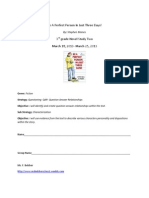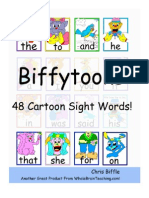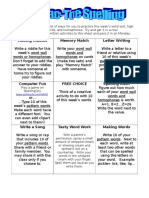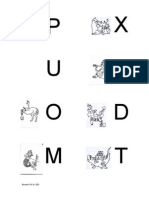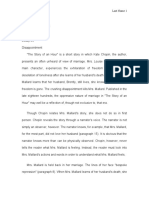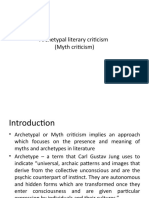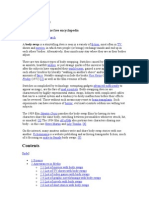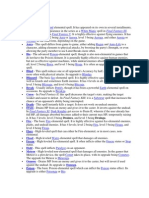Countable Uncountable Nouns
Countable Uncountable Nouns
Uploaded by
Anna San JoséCopyright:
Available Formats
Countable Uncountable Nouns
Countable Uncountable Nouns
Uploaded by
Anna San JoséOriginal Description:
Copyright
Available Formats
Share this document
Did you find this document useful?
Is this content inappropriate?
Copyright:
Available Formats
Countable Uncountable Nouns
Countable Uncountable Nouns
Uploaded by
Anna San JoséCopyright:
Available Formats
PART 1
Counting Uncountable Nouns
Questions
How much ....? = uncountable nouns
For example: How much coffee do you drink?
How many ....? = countable nouns
For example: How many cups of coffee do you drink?
Learn It
How do you count uncountable nouns? You can't, but you can measure them. You have to use counters
Noun
Uncountable Sugar
Jewellery
Uncountable How much
Question
Answer
Add a word
sugar is there?
How much
jewellery is
Wine
Furniture
Money
How much
How much wine
How much
How much money
cheese is there? is there?
furniture is there? is there?
There's a lot of There's some
There's a lot of
There's some
There's some
There's a lot of
sugar.
cheese.
wine.
furniture.
money.
there?
jewellery.
bowl
Make it
A bowl of
Countable sugar.
How many
piece
are there?
There's one
bowl of sugar.
round
A piece of
A round of
jewellery.
cheese.
How many
How many
Countable
pieces of
bowls of sugar
Question
jewellery are
Answer
Cheese
there?
rounds of
cheese are
there?
bottle
A bottle of wine.
How many
bottles of wine
are there?
piece
A piece of
furniture.
How many
pieces of
furniture are
there?
There are two There are three There's only one There are two
pieces of
rounds of
jewellery.
cheese.
bottle of wine.
pieces of
furniture.
bag
A bag of money.
How many bags
of money are
there?
There are four
bags of money.
Other words you can add to make uncountable nouns countable:You can put something into a container to count it, but the thing you're counting doesn't take the plural form. The
container takes the plural form:bag
A bag of money.
barrel
Two barrels of beer.
bottle
Three bottles of wine.
bowl
Four bowls of sugar.
box
Five boxes of cereal.
bucket
Six buckets of water.
can
Seven cans of Coke.
carton
Eight cartons of milk.
cup
Nine cups of coffee.
glass
Ten glasses of water.
jar
Eleven jars of honey.
packet
A dozen packets of butter.
a saucepan
Thirteen pans of rice.
tank
Fifteen tanks of petrol.
tin
Sixteen tins of custard.
tub
Seventeen tubs of margarine.
tube
Eighteen tubes of toothpaste.
You can measure something to count it, but it still doesn't take
the plural form. The measurement takes the plural form:-
litre
pint
pound / ounce / kilo etc...
For example:-
1 and a half litres of
milk.
Two pints of beer.
Two pounds / ounces /
kilos of butter.
You can measure uncountable nouns in other ways, using
shapes or portions. Again the measurement takes the plural
form.
ball
Ten balls of wool.
Three bars of
bar
soap.
Two pinches of
pinch
salt.
Five slices of
slice
cake.
Fourteen
spoon
spoonfuls of sugar.
Ten squares of
square
chocolate.
EXERCISE PART 1 - Match the items on the right to the most likely
measurement or container on the left.
A tube of
A box of
A can of
A slice of
A tank of
coke
petrol
cereal
toothpaste
cheese
PART 2
Countable vs Uncountable Nouns
Some, Any, A few, A little, Many, Much
How much ....? = uncountable nouns
For example: How much coffee do you drink?
How many ....? = countable nouns
For example: How many cups of coffee do you drink?
How much? How many?
Countable Nouns
Uncountable Nouns
In questions: We use how many with plural countable nouns:-
We use how much with uncountable nouns:-
"How many newspapers do you read every day?" "How much paper is in the printer?"
"How many Euros have you got?"
"How much money have you got?"
Revise It - How much and How many Lesson 36
Learn It
Some, Any
Countable
Uncountable
people.
money.
cups.
There are some
traffic.
books.
newspapers.
There is some
paper.
time.
chairs.
coffee.
shoes.
food.
Euros.
Statements:
Positive:
Countable
Uncountable
We can use some in positive sentences with
We can use some in positive sentences with
plural countable nouns:-
uncountable nouns:-
I read some books.
I would like some coffee.
Countable
Uncountable
people.
money.
cups.
books.
There aren't any
newspapers.
traffic.
There isn't any
time.
chairs.
coffee.
shoes.
food.
Euros.
Statement:
Negative:
paper.
We can use any in negative sentences with plural
We can use any in negative sentences with
countable nouns:-
uncountable nouns:-
I don't read any books.
I don't want any coffee.
Countable
Uncountable
people?
money?
cups?
Are(n't) there any
traffic?
books?
newspapers?
Is(n't) there any
time?
chairs?
coffee?
shoes?
food?
Euros?
We can use any in questions with plural
Questions: countable nouns:Positive Q:
Negative Q:
paper?
We can use any in questions with plural
uncountable nouns:-
Are there any books?
Do you need any coffee?
Aren't there any books?
Don't you need any coffee?
!Note! When you expect the answer to be "Yes." to an offer or polite request, you can ask a question
using some.
Question:
Countable
Uncountable
Can I have some books, please?
Would you like some coffee?
A few, A little
people
money
cups
There are a few
books
newspapers
traffic
There is a little
paper
time
chairs
coffee
shoes
food
Euros
Countable
Uncountable
"I meet a few people every day."
"There is a little paper in the printer."
"I only have a few Euros."
"I only have a little money."
Statements:
Positive:
Many, Much
people
money
cups
There aren't many
books
newspapers
chairs
shoes
traffic
There isn't much
paper
time
coffee
food
Countable
Uncountable
I don't read many books.
I don't drink much coffee.
Are there many books?
Do you need much coffee?
Statements:
Negative:
Questions:
Positive Q:
Don't you need much coffee?
Negative Q:
Aren't there many books?
EXERCISE PART 2 - Fill in all the gaps with much or many.
Press "Check" to check your answers.
You can click on the "[?]" button to get a clue.
Note that you will lose points if you ask for clues!
You have 3 minutes to complete the test.
1.
I don't drink
[?] coffee.
2. I don't have
[?] money.
4. John doesn't have
3. You don't have
[?] friends.
[?] time to do this test.
5. David reads a lot of books, but he doesn't read
6. Are there
7. Is there
[?] people in the room?
[?] milk in the fridge.
[?] newspapers.
8. Did you answer
9. How
[?] questions wrongly in the test?
[?] times have you been to England?
10. How
[?] work do you have to do?
Key part 2 ex
1. I don't drink much coffee.
2. I don't have much money.
4. John doesn't have many friends.
3. You don't have much time to do this test.
5. David reads a lot of books, but he doesn't read many newspapers.
6. Are there many people in the room?
7. Is there much milk in the fridge.
8. Did you answer many questions wrongly in the test?
9. How many times have you been to England?
10. How much work do you have to do?
COUNTABLE AND UNCOUNTABLE NOUNS
Algunos nombres son incontables tanto en
espaol como en ingls: bread, butter, Fire,
flour, food, milk, rice, Salt, sand, smoke, sugar,
water.
El hecho de que estos nombres sean
incontables puede inducir a error, porque en
ocasiones van precedidos de un nmero y de
un nombre contable: a slice of bread, one
bottle of milk, two kilos of butter, three cups of
sugar; se pueden contar las rebanadas, las
botellas, los kilogramos y las tazas.
News (las noticias) es un nombre que
aparece en plural, pero de hecho es un
nombre incontable en ingls, por ello lleva
verbo en singular: The news is good today.
Hay varios nombres incontables en ingls
que pueden ser plurales en espaol, lo que
suele inducir a error: coffee, furniture,
information, juice, soup, thunder.
INDEFINITE ARTICLES
En ingls existen dos tipos de artculos que
llamaremos indeterminados y
determinados. Los artculos indeterminados
a/an, some y any se usan para designar a
personas u objetos cualesquiera. El artculo
determinado the se utiliza para referirnos a
personas o cosas especficas.
Los artculos indeterminados a/an
acompaan a nombres contables en singular
(poe ejemplo: a boy, an apple). Los nombres
que empiezan por sonido consonntico utilizan
a: a door, a car, a uniform (hay algunas
palabras que empiezan por vocal, pero su
primer sonido es consonntico como uniform,
European, universal, ewe). Si comienzan con
sonido voclico, llevan an: an apple, an
umbrella, an hour.
Some indica cantidad indeterminada. Se
utiliza en oraciones afirmativas con nombres
contables en plural (He has some books from
the library) y con nombres incontables (There
is some sugar in the bowl).
El artculo indefinido any se utiliza en
oraciones negativas e interrogativas tanto con
nombres contables en plural (There arent any
pens here) como con nombres incontables (Is
there any sugar in the bowl?)
EXPRESSIONS OF QUANTITY
How much y How many se usan para
preguntar por la cantidad. How many se utiliza
con nombres contables en plural para
preguntar sobre el nmero:
How many pupils are there in the room?
How much se usa con nombres incontables
para preguntar por la cantidad:
How much sugar is there in the coffee?
QUANTIFIERS FOR LARGE AMOUNTS
A lot of se usa en frases afirmativas tanto
con nombres contables en plural como con
incontables en el sentido de muchos/una gran
cantidad de:
There are a lot of large cars on the roads.
There is a lot of crime in that town.
Lots of en lugar de a lot of es muy frecuente
cuando se habla de manera informal.
Much se utiliza ante nombres incontables
en frases negativas e interrogativas en el
sentido de mucho:
Do you have much work to do?
There isnt much money in my bank account.
Many se utiliza ante nombres contables en
plural en frases negativas e interrogativas en
el sentido de muchos:
There arent many trees in the park.
Are there many accidents on this road?
INTENSIFIERS
Too much seguido de nombres
incontables y too many seguido de nombres
contables se utilizan para expresar que algo
es ms de lo necesario, ms que suficiente:
Ive put too much sugar in my tea
Ive got too much work.
There are too many students in this class.
Ive got too many books. I need some new
shelves!
Enough seguido de nombres contables e
incontables se utiliza para expresar que algo
es lo necesario, lo suficiente:
Are there enough chairs? No. There are twenty
people and fifteen chairs.
You might also like
- Be A Perfect Person in Just 3 DaysDocument10 pagesBe A Perfect Person in Just 3 Daysapi-207804929No ratings yet
- Biffytoons ManualDocument171 pagesBiffytoons ManualGeorgia Ramsey100% (2)
- Practice Tracing The Vocabulary WordsDocument3 pagesPractice Tracing The Vocabulary WordsSakura ReiNo ratings yet
- Irregular AdverbsDocument4 pagesIrregular AdverbsAnna San José100% (1)
- Carrion Crown Character Creation GuideDocument16 pagesCarrion Crown Character Creation GuideJohn Lynch100% (6)
- Bleach D20 Printer Sheet V1.3Document12 pagesBleach D20 Printer Sheet V1.3Daniel LaneNo ratings yet
- B Ing Countable Uncountable NounsDocument40 pagesB Ing Countable Uncountable NounsSMK SETIA KARYANo ratings yet
- COMIDA en Español ArgentinaDocument3 pagesCOMIDA en Español Argentinasol continiNo ratings yet
- Primary 3 English: Countable NounsDocument22 pagesPrimary 3 English: Countable NounsliangthiangchorNo ratings yet
- Countable Uncountable NounsDocument21 pagesCountable Uncountable Nounsj_sha93No ratings yet
- Quantifiers Material (BEG) 1Document3 pagesQuantifiers Material (BEG) 1Nandaa MuhmaliaaNo ratings yet
- A1-Singular and Plural NounsDocument8 pagesA1-Singular and Plural NounsXavier CandoNo ratings yet
- Write and Wipe: PrimerDocument6 pagesWrite and Wipe: PrimerFunninhaNo ratings yet
- TictactoeDocument1 pageTictactoeapi-327311227No ratings yet
- Simple Past Regular-IrregularDocument36 pagesSimple Past Regular-IrregularIsa RiveraNo ratings yet
- Activity: I Love Christmas Because...Document9 pagesActivity: I Love Christmas Because...LeannaNo ratings yet
- Vocabulary Matching Worksheet - Body PartsDocument1 pageVocabulary Matching Worksheet - Body PartsRahmi Aulia100% (1)
- Doctor Hospital DiceDocument2 pagesDoctor Hospital Diceapi-482903737No ratings yet
- Spelling Menu March 24Document1 pageSpelling Menu March 24Lisl WindhamNo ratings yet
- Tiny Talk 1A Student BookDocument51 pagesTiny Talk 1A Student BookCarolina BeltránNo ratings yet
- KinderDocument47 pagesKinderDianaNo ratings yet
- Earth Day Sight Word Color by CodeDocument8 pagesEarth Day Sight Word Color by CodeAnna FranzeseNo ratings yet
- Spelling Strategies Single Consonants That Have More Than One SoundDocument16 pagesSpelling Strategies Single Consonants That Have More Than One SoundМаксим ВолынецNo ratings yet
- Spelling Words TicTacToeDocument1 pageSpelling Words TicTacToeFirstGradeFactoryNo ratings yet
- Board Game - How OftenDocument2 pagesBoard Game - How OftenDaniella Moraes100% (1)
- 10 Easy Steps To Teaching The Solar SystemDocument102 pages10 Easy Steps To Teaching The Solar SystemKitimboNo ratings yet
- Table of English TensesDocument5 pagesTable of English TensesWAYAN123456No ratings yet
- A. Q Abbasi Whatsapp Group Join Us # 0301-2383762Document45 pagesA. Q Abbasi Whatsapp Group Join Us # 0301-2383762Muhammad NumanNo ratings yet
- Vocabulary Games and ActivitiesDocument5 pagesVocabulary Games and ActivitiesPepNo ratings yet
- Cool Kids 1 TB SampleDocument24 pagesCool Kids 1 TB SampleMarijuchis OspinaNo ratings yet
- Doctor Hospital Reading PracticeDocument2 pagesDoctor Hospital Reading Practiceapi-482903737No ratings yet
- General Poster Design Principles - HandoutDocument2 pagesGeneral Poster Design Principles - HandoutMazhar MehmoodNo ratings yet
- Irregular VerbsDocument82 pagesIrregular VerbsAnna BespekaNo ratings yet
- T L 023 Large Tracing Letters Phase 2 - Ver - 2 PDFDocument30 pagesT L 023 Large Tracing Letters Phase 2 - Ver - 2 PDFmr chahalNo ratings yet
- Lesson Plan OrderDocument15 pagesLesson Plan OrderArmaMaretaNo ratings yet
- The Alphabet: Teaching Kids ResourceDocument2 pagesThe Alphabet: Teaching Kids ResourceMarykate's English CoachingNo ratings yet
- Letter, Word and Sentence Formation: Cursive WritingDocument28 pagesLetter, Word and Sentence Formation: Cursive WritingHome Organising by JR100% (1)
- Cooking Verbs Esl Picture Dictionary Worksheet PDFDocument2 pagesCooking Verbs Esl Picture Dictionary Worksheet PDFCerpar MilNo ratings yet
- What Do You Eat?: An Apple A Car MittensDocument24 pagesWhat Do You Eat?: An Apple A Car MittensEnglish ClassNo ratings yet
- Countable and Uncountable NounsDocument32 pagesCountable and Uncountable NounsPaula Capelo0% (1)
- We Need To Use Visual Aids, Easy Structures and Short SentencesDocument8 pagesWe Need To Use Visual Aids, Easy Structures and Short SentencesXaviNo ratings yet
- Animated Literacy FlashcardsDocument23 pagesAnimated Literacy FlashcardsStacy WolfNo ratings yet
- 4 Regular Verb Charts & 4 Irregular Past Tense Sentence WorksheetsDocument10 pages4 Regular Verb Charts & 4 Irregular Past Tense Sentence WorksheetsYanri RamdhanoNo ratings yet
- Grammar Pack 1 - Nouns, Adjectives and VerbsDocument53 pagesGrammar Pack 1 - Nouns, Adjectives and Verbsnadirrah nzriNo ratings yet
- Bedroom Vocabulary Esl Matching Exercise Worksheets For KidsDocument4 pagesBedroom Vocabulary Esl Matching Exercise Worksheets For KidsMalenius MonkNo ratings yet
- Free Back To School Lessons: by The Best of Teacher Entrepreneurs Marketing Cooperative - 2018Document41 pagesFree Back To School Lessons: by The Best of Teacher Entrepreneurs Marketing Cooperative - 2018SoniaNo ratings yet
- Short Vowel Word FamiliesDocument10 pagesShort Vowel Word Familiesمحمود المتوليNo ratings yet
- Entrée (Main Course) and Two Side Dishes To Complete Every Week. If They Finish TheirDocument3 pagesEntrée (Main Course) and Two Side Dishes To Complete Every Week. If They Finish TheirmaywattsNo ratings yet
- DemosecretwordsamplepdfDocument8 pagesDemosecretwordsamplepdfSiew Kien ChinNo ratings yet
- Vowel Teams Word List Reading UniverseDocument4 pagesVowel Teams Word List Reading UniverseyvannaguimaraesNo ratings yet
- If I Were in Your Place... : Giving AdviceDocument2 pagesIf I Were in Your Place... : Giving AdvicetobizarreNo ratings yet
- J HandwritingDocument13 pagesJ HandwritingNoctu Castle Age EvonyNo ratings yet
- Lets Talk About You Fun Activities Games 4486Document1 pageLets Talk About You Fun Activities Games 4486Reall Good MeetNo ratings yet
- VerbosDocument8 pagesVerbosWendy TorresNo ratings yet
- Elf NotesDocument1 pageElf NoteswickedwitchofwestmichiganNo ratings yet
- Countable Uncountable and Determiners Grammar Guides - 4850233333Document11 pagesCountable Uncountable and Determiners Grammar Guides - 4850233333heberNo ratings yet
- Sight Word Sentence: Created by Brenda TejedaDocument10 pagesSight Word Sentence: Created by Brenda TejedaEngy HassanNo ratings yet
- Unit 9 Countable and Uncountable NounsDocument29 pagesUnit 9 Countable and Uncountable Nounsabdul satarNo ratings yet
- Handwriting AaDocument2 pagesHandwriting AaToni SimplyHomeschoolNo ratings yet
- TTM Fill Your Fruit BowlDocument6 pagesTTM Fill Your Fruit BowlEddy KingsNo ratings yet
- Let S Talk About AdventureDocument1 pageLet S Talk About AdventureEirini StypsianouNo ratings yet
- COP (Verb, Noun)Document8 pagesCOP (Verb, Noun)Anna San JoséNo ratings yet
- Word ClassDocument2 pagesWord ClassAnna San JoséNo ratings yet
- Adverbs With 2 Forms: WorksheetDocument27 pagesAdverbs With 2 Forms: WorksheetAnna San JoséNo ratings yet
- Advs With 2 Forms-TheoryDocument10 pagesAdvs With 2 Forms-TheoryAnna San JoséNo ratings yet
- Review Novel Demon Road by Nur Aini SudrajatDocument2 pagesReview Novel Demon Road by Nur Aini SudrajatAin SudrajatNo ratings yet
- Indonesia, Vietnam & India LiteratureDocument11 pagesIndonesia, Vietnam & India LiteratureMaria LouiseNo ratings yet
- English 7 - Q4 - W1-1 (God Said, "I Made A Man)Document38 pagesEnglish 7 - Q4 - W1-1 (God Said, "I Made A Man)Reverie WritesNo ratings yet
- G. 8 Curriculum Map (Final)Document14 pagesG. 8 Curriculum Map (Final)You YouNo ratings yet
- 1Document27 pages1Bogdan Si DianaNo ratings yet
- The Heart of The Nation Merlinda Bobis's Banana Heart SummerDocument3 pagesThe Heart of The Nation Merlinda Bobis's Banana Heart SummermNo ratings yet
- A Brief History of English LiteratureDocument53 pagesA Brief History of English LiteratureKareena KapoorNo ratings yet
- Black Beauty Second Term My Works - 4-5-6 - FinalDocument28 pagesBlack Beauty Second Term My Works - 4-5-6 - FinalHany FaroukNo ratings yet
- The Arrogant HorseDocument1 pageThe Arrogant Horsenaru naruNo ratings yet
- Literary Analysis ExampleDocument3 pagesLiterary Analysis ExampleAlan Christian NeisNo ratings yet
- The Pit and The Pendulum and Other StoriesDocument11 pagesThe Pit and The Pendulum and Other Storiesdunae100% (4)
- RogerEbert GameAsArtDocument25 pagesRogerEbert GameAsArtGuy Blissett AmadoNo ratings yet
- Compliment To Entire PDFDocument159 pagesCompliment To Entire PDFEzequiel Ezequiel100% (1)
- Exercitii Gramatica EnglezaDocument6 pagesExercitii Gramatica EnglezaMaryleNo ratings yet
- PR OneOfUsISLying WorksheetAnswerKey3Document3 pagesPR OneOfUsISLying WorksheetAnswerKey3Tammy Reyes VélizNo ratings yet
- Can't, Have To, Don't Have To, May, Must, Mustn't, Be Able To, Needn'tDocument2 pagesCan't, Have To, Don't Have To, May, Must, Mustn't, Be Able To, Needn'tЛеся СтроченкоNo ratings yet
- The Short StoryDocument13 pagesThe Short StoryLisa Damayanti YoeshandraNo ratings yet
- DLP EN6RC Ih 2.24.3Document4 pagesDLP EN6RC Ih 2.24.3Juvelyn Patalinghug100% (2)
- Prezentacija Arhetipska KritikaDocument14 pagesPrezentacija Arhetipska KritikaTijana RaševićNo ratings yet
- Module 3Document20 pagesModule 3Honey Joy JuanNo ratings yet
- Hemingway Reading ComprehensionDocument2 pagesHemingway Reading ComprehensionTamaraNo ratings yet
- WCTC 2017 BondCamille TheExperienceofFlyinDocument75 pagesWCTC 2017 BondCamille TheExperienceofFlyinmurthy tataNo ratings yet
- More DOOM Monsters! - Daemons & DeathraysDocument3 pagesMore DOOM Monsters! - Daemons & Deathraysbigkev73No ratings yet
- I Am The Last Villainess Chapter 1Document10 pagesI Am The Last Villainess Chapter 1Thanatcha SarachanNo ratings yet
- Elements of A Short StoryDocument21 pagesElements of A Short StoryArt Veloso Mangubat100% (1)
- Body Swap: From Wikipedia, The Free EncyclopediaDocument6 pagesBody Swap: From Wikipedia, The Free Encyclopediakashi98490% (1)
- Spells List BlackDocument3 pagesSpells List BlackJoseph Angelo GagliardiNo ratings yet
